11th London Chess Classic
By the time the magazine arrives, most of the components of the London Chess Classic will be in place. For all tournament players we will have: a 9-round FIDE-rated Open beginning Friday, November 29th, weekend tournaments, weekday tournaments, a one-day Rapid and, by popular demand, the Super Blitz, which will conclude the London Chess Classic Festival on Sunday December 8th. You can enter all these events at LondonChessClassic.com.
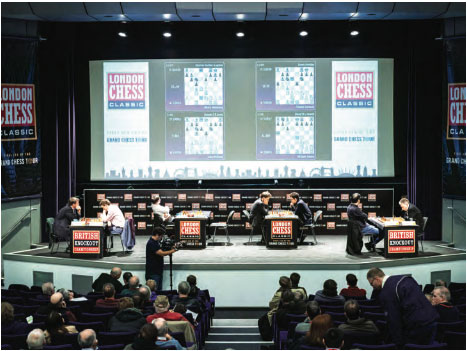 For women and girls, I’m really delighted to announce the 1st English Women and Girls Rapidplay Championship on Saturday December 7th. For those interested in developing chess and improving the levels of female participation the theme of the 7th London Chess Classic Conference, supported by Chess in Schools and Communities, the European Chess Union, FIDE and the ECF, will be ‘Chess and Female Empowerment’. The conference will be held at the Irish Community Centre in Hammersmith over the weekend of November 30th and December 1st. Please see londonchessconference.com for more information.
For women and girls, I’m really delighted to announce the 1st English Women and Girls Rapidplay Championship on Saturday December 7th. For those interested in developing chess and improving the levels of female participation the theme of the 7th London Chess Classic Conference, supported by Chess in Schools and Communities, the European Chess Union, FIDE and the ECF, will be ‘Chess and Female Empowerment’. The conference will be held at the Irish Community Centre in Hammersmith over the weekend of November 30th and December 1st. Please see londonchessconference.com for more information.
For aspiring chess tutors or existing ones who wish to develop their skills there will be the CSC Chess teacher courses and the ECU advanced course, as well as a course on teaching mathematics with chess run by Rita Atkins.
If you would like to watch the elite event, I’m afraid tickets are not quite on sale yet as the format is yet to be finalised. As ever, entry to any of the tournaments at the Olympia Conference Centre will also include free entrance to the theatre to watch the grandmaster tournament. Please check LondonChessClassic.com or follow the tournament on Twitter.
Chess for Change
Over the last couple of years Chess in Schools and Communities have increased the focus on the community aspect of what we do. This includes developing and running chess activities for older people, delivering chess to care homes, to children in hospital with eating disorders, and many other projects. Our prison project has developed apace with weekly clubs now established in six prisons and several more planned but in need of funding.
It’s nearly 10 years since the charity was formed and now, for some reason, our work has come to the attention of the government. In a speech given in Brighton just before last year’s London Chess Classic, Matt Hancock, the Health Minister, said:
“In Brighton the Dementia Action Alliance is partnering with Chess in Schools and Communities to give free chess lessons to older people, helping them keep their minds active while giving them opportunities to socialise. Participating in music can help bring people together and stimulate memories — through Singing for the Brain for example. Commonsense interventions like these are simple yet effective. And I want to see more of them.”

CSC is joining a new initiative from the NHS called Social Prescribing and is registered with an NHS portal which will enable Social Prescribers to have patients referred to them by GPs when they think an activity may be stimulating and/or help diminish their social isolation. Social prescribers could recommend anything from walking groups to chess.
Amidst the current political turmoil, Matt Hancock is unusual, as he has actually been in post for more than five minutes. Also last year I was invited to see the then Minister of Prisons Rory Stewart (pictured below) to discuss our prison programme which the Ministry of Justice (MoJ) is helping us promote to prison governors.

It proved to be very hard to get the programme started. I had many frustrating experiences and even on one occasion, a direct encounter with the contents of a chamber pot, but there is real momentum now. In August we managed to get clearance from the MoJ for internet access at HMP Wandsworth and we entered a team in the World Prison Internet Championships on Chess.com organised by Mikhail Korenman who runs a big programme at Cook County Jail.
The prisoners were not allowed to use the mouse, so CSC Prisons Coordinator Peter Sullivan, ECF Manager of Prisons Chess Carl Portman and I entered the prisoners’ moves and made the replies on real sets and boards. This made our players 4-5 minutes slower in a 15-minute time limit, but if ever there was a case of the taking part being more important, this was it. We hope to do more such activities in the future and in some prisons, where there are screens in cells — with limited access of course — chess could be very popular.
I’d be pleased to hear from people who would like to work in prisons or even chess clubs who would be interested in taking a team to play at their local prison.
Calendar Crush
This is not a new computer game, but a description of the timetable of world chess in the last four months of the year. As soon as the World Cup ends, the FIDE Swiss on the Isle of Man begins and then there are the European Team Championships and the European Club Cup. Sandwiched in amongst all this are the Hamburg leg of the FIDE Grand Prix, the Bucharest Grand Chess Tour Rapid and Blitz, and the Calcutta Grand Chess Tour Rapid and Blitz!
That is all followed, a day or two later, by the London Chess Classic. The day after the London Chess Classic the final leg of the FIDE Grand Prix begins in Tel-Aviv and that takes us to Christmas.
There won’t be a World Cup next year, but there is the Olympiad at Khanty-Mansiysk and a World Championship. There needs to be better forward planning in chess so that more events can be staged in the first half of the year.
I am thinking about the 12th London Chess Classic in 2020 now. A new venue is required, with lower costs.
Look East!
In general, FIDE seems to be improving its organisation and there have been a few positive moves. There is a proper functioning press office and social media presence. Moreover, the website has been revamped and looks quite nice. That’s been an embarrassment for years. However, with the announcement of Ekaterinburg as the venue for the 2020 Candidates, the siting of the Women’s Grand Prix at Skolkovo outside Moscow, as well at the 2020 Olympiad in Khanty-Mansiysk followed by the 2022 Olympiad in Minsk, it’s clear that the dream of the FIDE President and Executive to get better acquainted with western companies is still very much a work in progress.
Grand Chess Draw
The Sinquefield Cup was criticised for the large number of draws and there were few decisive games. Just 12 of the 66 games ended decisively. There was the usual chorus of classical chess is dead, but this is nonsense. Most events this year have been very entertaining and this is almost a golden period in my view. The issue is that if you have only very closely ranked players in your event then you will get a lot of draws. We had this issue with the final GCT event at the Classic a few years back. Invite an interesting mix of players with a little variation in rating and you get a great event, just as Wijk aan Zee always manages.
At least the Sinquefield Cup ended sensationally as Ding Liren became the first player to defeat Magnus Carlsen in a tiebreak since Levon Aronian eliminated him from the Candidates in 2007. After that Carlsen won some 10 play-offs in a row, including against Caruana and Karjakin.
Magnus at least managed to steady himself after his travails in the Saint Louis Rapid and Blitz. The champ drew 9 and won his last two Classical games to finish equal first with Ding, so his subsequent play-off defeat was a serious upset and thrust Ding Liren forward as his most likely challenger. It was noteworthy that Ding also defeated Fabiano Caruana who I should emphasise I am not writing off at all. The closing stages of that power-packed encounter can be found inside, as can Ding’s magical bishop retreat which floored Magnus.
The GCT standings with two Rapid & Blitz events to play are:
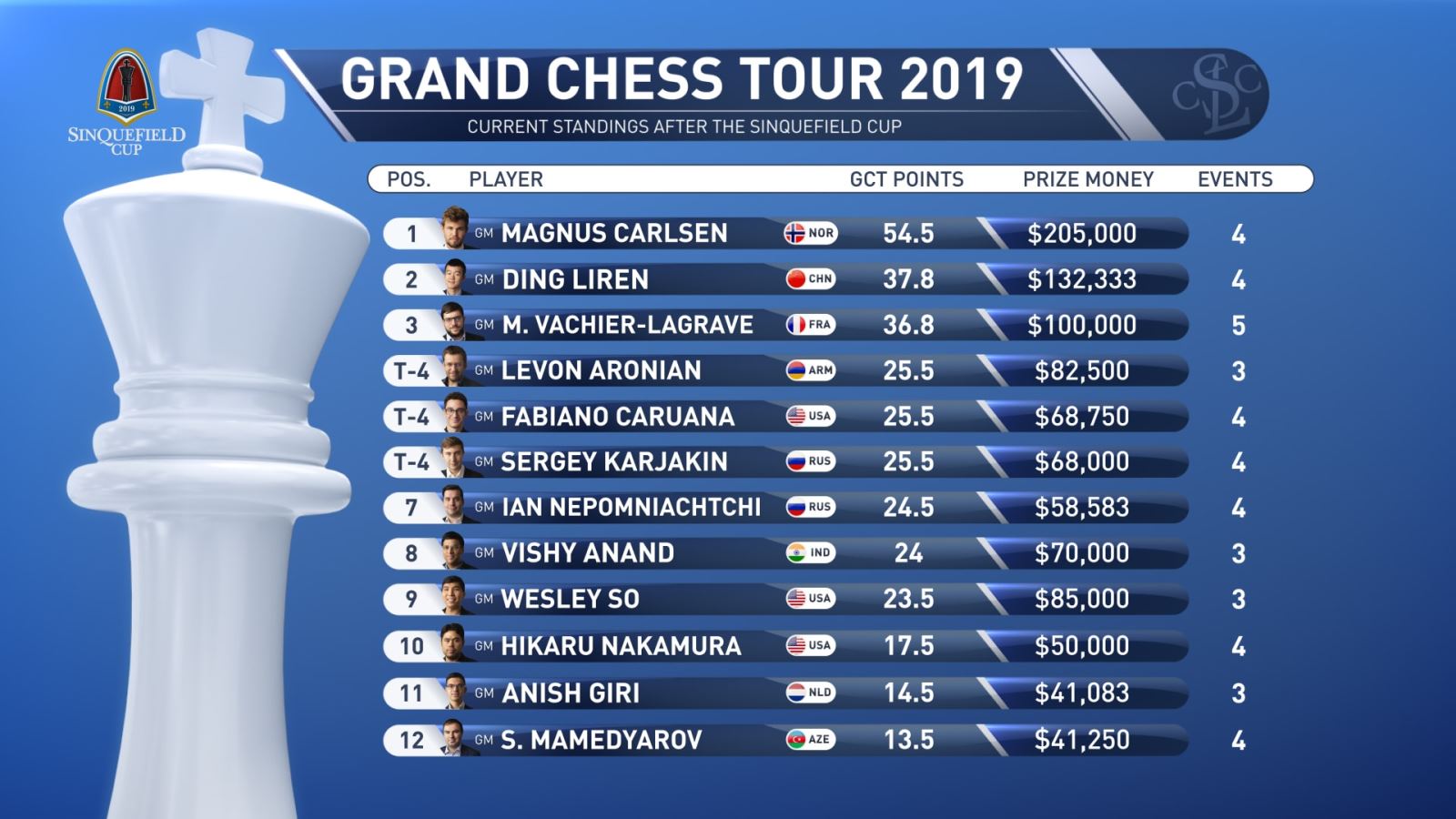
Carlsen’s father, Henrik, told me Magnus is already mathematically qualified for the final and you would expect Ding Liren to get there as well. The other two spots could go to any of the chasing pack. Don’t rule out Vishy — he really should have won the Sinquefield Cup.
About CHESS Magazine
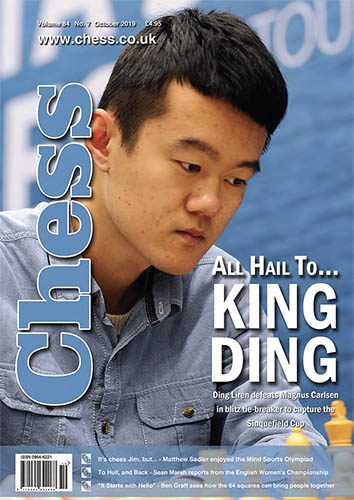
The above feature is reproduced from Chess Magazine October/2019, with kind permission.
CHESS Magazine was established in 1935 by B.H. Wood who ran it for over fifty years. It is published each month by the London Chess Centre and is edited by IM Richard Palliser and Matt Read.
The Executive Editor is Malcolm Pein, who organises the London Chess Classic.
CHESS is mailed to subscribers in over 50 countries. You can subscribe from Europe and Asia at a specially discounted rate for first timers, or subscribe from North America.

ChessBase products from Chess & Bridge
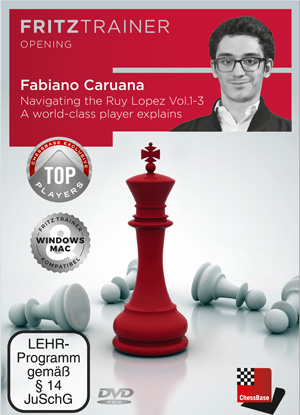 Navigating the Ruy Lopez Volumes 1 to 3
Navigating the Ruy Lopez Volumes 1 to 3
Fabiano Caruana, ChessBase PC-DVD,
running time: 16 hours
RRP £80.86 SUBSCRIBERS £75.00
A world-class player explains
The Ruy Lopez is one of the oldest openings which continues to enjoy high popularity from club level to the absolute world top. In this video series, American super-GM Fabiano Caruana, talking to IM Oliver Reeh, presents a complete repertoire for White. In a total of three volumes, Caruana examines all Black replies after 1.e4 e5 2.Nf3 Nc6 3.Bb5. The world’s number two not only shows very concrete lines, but also outlines general approaches depending on the demands of each variation. How can White keep track of the manifold solid closed set-ups (e.g. the Breyer)? What’s the best way to defuse the risky Schliemann-Jaenisch Gambit? Which transitions to the endgame against the Open Variation are particularly unpleasant for Black? What are the guiding threads to follow against the Berlin Defence?
In short, this trilogy not only provides the viewer with a complete premium Ruy Lopez repertoire, but also with fascinating insights into the mindset and chess understanding of a World Championship contender. Epiphanies guaranteed!
Order online from
The London Chess Centre or Chess4Less (USA)

Typical Mistakes by 1000-1600 Players
Nicholas Pert, PC-DVD,
running time: 4 hours, 40 minutes
RRP £26.95 SUBSCRIBERS £24.25
After the success of the Typical Mistakes videos aimed at higher rated players, I have decided to focus on mistakes that are made by players rated from 1000-1600. Within the video series there are several chapters, and each chapter comprises a theme for games played between players rated between 1000-1600. Several games are explained and then there are many interactive examples for the viewer to have a go at themselves. Hopefully this will not only help the viewer to improve their own game, but also motivate you to work harder on areas where there may be a weakness. The chapters focus on key areas such as “Tactics”, “Openings”, “Endgames”, “Attacking” etc. Each chapter will show several games followed by interactive examples. There are also some summary games which highlight several typical mistakes which are made in the same game.
Order online from
The London Chess Centre or Chess4Less (USA)
You can also find these products in the ChessBase Shop
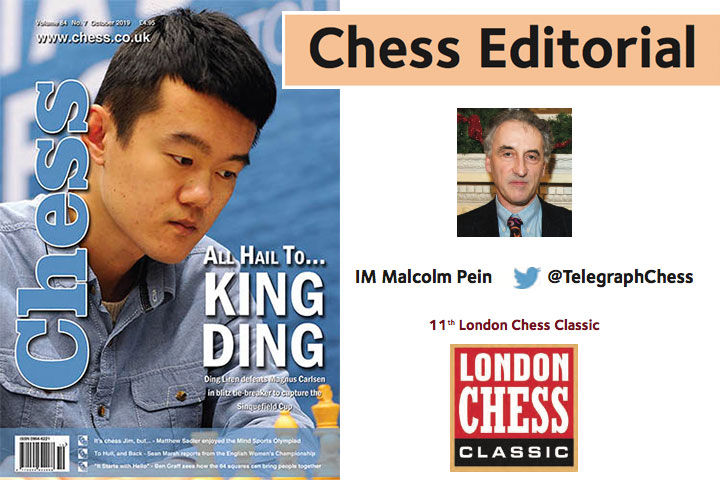

















 For women and girls, I’m really delighted to announce the 1st English Women and Girls Rapidplay Championship on Saturday December 7th. For those interested in developing chess and improving the levels of female participation the theme of the 7th London Chess Classic Conference, supported by Chess in Schools and Communities, the European Chess Union, FIDE and the ECF, will be ‘Chess and Female Empowerment’. The conference will be held at the Irish Community Centre in Hammersmith over the weekend of November 30th and December 1st. Please see
For women and girls, I’m really delighted to announce the 1st English Women and Girls Rapidplay Championship on Saturday December 7th. For those interested in developing chess and improving the levels of female participation the theme of the 7th London Chess Classic Conference, supported by Chess in Schools and Communities, the European Chess Union, FIDE and the ECF, will be ‘Chess and Female Empowerment’. The conference will be held at the Irish Community Centre in Hammersmith over the weekend of November 30th and December 1st. Please see 




 Navigating the Ruy Lopez Volumes 1 to 3
Navigating the Ruy Lopez Volumes 1 to 3





